Kay Costello: I was born and raised in Grand Rapids, Minnesota, and moved to Cook County from western Colorado in 1983 – to Good Harbor Hill, Croftville, Pike Lake, East and now West Grand Marais. My two sons live in LaCrosse and Hovland. My professional life has centered around health care and educational administration, and I hold a master’s degree in administrative studies. I have enjoyed serving on the Grand Marais City Council for six years and I am ready for a new level of community involvement.
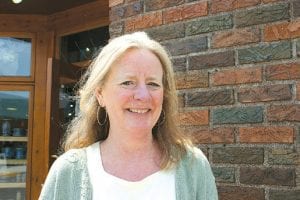
If you feel that the election season has come earlier this year, you are correct. The Minnesota primary election, held in September in the past, is being held this year on Tuesday, August 10. Much of Cook County votes by mail-in ballots which will be sent to voters the week of July 20th, so yes, the time to think about who you want representing you is fast approaching.
The democratic process is alive and well in Cook County. There are at least two candidates in each of three districts and in one—District 3— there are seven. At the closing of the filing period there were eight candidates in the District 3 race. One citizen who filed, James Smith of Grand Marais, has told the Cook County
News-Herald
that he decided to withdraw. Reached by telephone, Smith said he didn’t think the time was right but added, “I may run at some time in the future.”
Thisweek, the Cook County News-
Herald
is focusing on the citizens running for Cook County Commissioner District 3. We contacted each of the candidates and asked a few questions. Candidates were asked to keep their answers brief—under 250 words for the entire response, so it was a challenge. Their answers follow with candidates listed in alphabetical order.
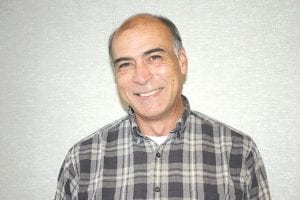
Robert “Bob” Fenwick: My wife Jennifer and I are 20+ year residents of Cook County, with three sons now calling this home. After attending the U of M my private sector work was mainly in sales management. As county commissioner, while building intergovernmental relationships, I remain a strong advocate for local autonomy.
What biographical information would you like
voters to know about you?
Do you believe the county should hire
an administrator or coordinator to assist the county board?
Costello:
Not yet. I do think, however, that there is a need now for professional oversight for some of the 1% Sales Tax projects, so perhaps it would be wise to bring in a project coordinator, especially for the community center and library projects.
Fenwick:
Political boards are inefficient and ineffective in some areas. For example, managing human resources (evaluations, grievances, negotiations, etc.), managing collaborations crossing departmental and governmental lines, budgeting objectively and impartially, or implementing their own policies. Knowing that proper administrative help will lead to efficiencies and cost savings, I would support it.
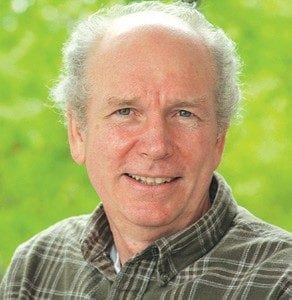
Garry Gamble: I am a lifelong resident of Minnesota with 25 years in management. believe people feel alienated from those they have chosen to represent them. We should never let a crowded schedule or an overly zealous sense of duty stop us from taking time to talk with those whose lives are affected by our decisions.
Gamble:
Not necessarily. Especially considering the total population of our county and budget constraints. Of the seven counties among Minnesota’s 87 counties who have populations under six thousand, only one has an administrator. 31% of the total 87 operate without an administrator or coordinator position. Cook County is ranked 84 among Minnesota’s 87 counties. There could be other issues that are contributing to less efficient or effective governance; issues that may or may not be resolved with an additional position.
Hakes:
Yes. Cook County needs a professional to navigate the complexities of federal, state and county legislation and programs, thus freeing the county board to focus on establishing direction and priorities. Lowering compensation paid to commissioners, combined with savings achieved by an effective administrator, will offset the expense of this new position.
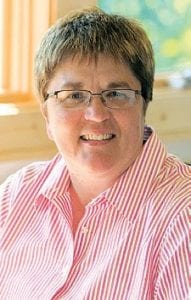
Sue Hakes: I am mayor of Grand Marais, a small business owner, an Augsburg College graduate, Cook County resident since 1995, community volunteer, wife, daughter, sister, and neighbor! See www.VoteSueHakes.com
Kuckler:
I think the size and complexity of county government calls for a full time administrator to ensure that the plans of the county board are implemented. How do we pay for another county employee? Simple, we should cut back the salaries and per diems of the county board and use the savings to help defray the expense of a county administrator. The county commissioner job was never meant to be a full-time, full-pay position.
Speck:
No! Commissioners are compensated enough to allow them to adequately research and make wellreasoned decisions on issues that come before the board. If the board decides to hire an administrator, that salary should come without increasing the county budget.
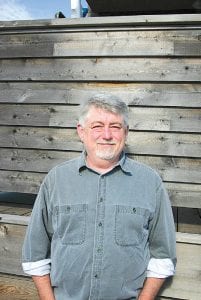
Keith Kuckler: I grew up on a small family farm, graduated as a National Merit Scholar from Stillwater High School and attended the U of M briefly. My love of the land led me to own and farm 320 acres southwest of Minneapolis. My love of the wild quality of Cook County led me to move here 24 years ago. I have served as board member and chairperson of the Art Colony, Cook County Planning Commission, and the Board of Adjustment. My work in the construction business has given me a thorough knowledge of the land and people of Cook County. My education and job experience have given me the ability to think critically and to find creative solutions to problems.
Williams:
No. The last thing the county needs is another high paid administrator to micro-manage. There are times when the county board needs additional expertise for decision-making, but that expertise already exists within the county. We just need to identify individuals willing to act as consultants when the need arises.
What will you do to see that the 1% sales tax
will be distributed to best benefit Cook County?
Costello:
Having been an original member of the Sales Tax Committee that prioritized the projects in the sales tax legislation, I am committed to utilizing this opportunity to its greatest benefit. This will entail continued vigilance of each project’s progress and, if necessary, investigating funding options in addition to the sales tax revenue.
Fenwick:
First I would adhere to the results of the public process and commit to the success of all projects. Creative timing and use of all available funding mechanisms will enhance our limited resources. To assure best benefits to our citizens we should have goals like utilize local employment and goods, bolster our economy, plan to save energy costs, maintain or cut maintenance costs, and that new and improved amenities benefit as many residents as possible.
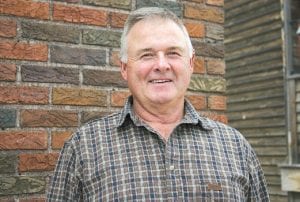
Lloyd Speck: I am 62 years old and lived and worked in Cook County my entire life, graduating from CCHS in 1965. I have three daughters and an 84-year-old mother who has lived here all her life. I maintained a masonry and grave digging business to the present and worked at LTV steel mining for 30 years. Being on the county Planning & Zoning Board since 2005 has given me a better perspective in addressing county challenges. I am a decision maker, not a politician.
Gamble:
First, it must be understood that the distribution of these funds is governed by statute. As to prioritizing their distribution in the near term, improvements to Cook County community centers and the Grand Marais Public Library would take precedent while further feasibility studies are conducted on other authorized projects.
Hakes:
The 1% Sales Tax was originally envisioned as a vehicle to create recreation infrastructure benefiting residents and tourists alike. It was billed as a way to finance quality of life improvements at a relatively small cost to residents. I support this original vision. Unfortunately, after four years of confusion, the public has no idea how the 1% funds will be spent. I will work to prioritize projects, giving preference to those which received wide public support and are consistent with the original vision. I do not support using these funds on speculative ventures.
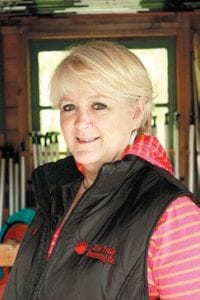
Cathi Williams: I was born and raised in Madison, WI. Married to David Williams, with five adult children and three grandchildren. We are original owner/operators of Bear Track Outfitting Co., Bally Creek Cabins, and Fishin’ Chics Charters. Graduated from Monona Grove High School and Madison Area Technical College with AA degree in commercial art. I am president of Bethlehem Lutheran Church Women, board member of the Grand Marais Area Tourism Association, copresident of Sawtooth Mtn. PTO, coordinator of Youth Ski League, Blandin Leadership School alumni, chairperson of the Pool Committee, the Old Ski Hill Committee.
Kuckler:
While not everyone agreed with the sales tax proposal, it is done and it is time to move on. We should move ahead on the projects that we can do now, while planning for the eventual use of some of the money for better communication access. It is imperative that we come up with a way to keep much of the money spent on these projects in Cook County. The county should adopt a policy that mandates that a certain percent of any construction project done with public money be spent locally. It makes little sense to tax ourselves to provide jobs for contractors and suppliers outside of the county.
Speck:
I would assure that money would be allocated based on evidence of what would most benefit the majority of the people. I would also take into consideration projected financial costs each project would require to maintain. I do not want huge budget increases maintaining these projects. Commissioners are responsible to protect the taxpayers’ money while managing the county. I will not be influenced by special interest groups.
Williams:
Of the items that voters approved last November, the swimming pool is the most critical, as the building around the current pool is rapidly decaying. With so many lakes and streams, it is imperative that our children learn to swim. The library expansion should be put on hold, as there may be other alternatives such as a bookmobile that can serve outlying areas. Everyone wants broadband, but at what cost? With technology changing rapidly, it may become obsolete before it can even be utilized and the financial risk is too great.
What do you feel is the most important
issue facing Cook County today?
Costello:
Balancing the development of a unique and desirable area with affordable opportunities for young people, families and a solid workforce. The future of Cook County depends on continuing to attract and retain progressive minds and capable workers. County government has a critical role in providing and managing a multitude of services that contribute to the quality of life here, so let your voice be heard: vote!
Fenwick:
Notwithstanding the economic crisis, we must be prepared for the governmental changes that will be imposed on us. We already hear the rhetoric like closing courthouses (Cook County being one), too many counties, only 15 social services administrative sites, less local land authority. There will be benefits to some changes, but we must be vigilant to protect our representation and local autonomy.
Gamble:
Certainly declining financial capital is a major concern; however, I would argue that declining social capital trumps revenues as the most important issue. It is foundational to every other issue we face. Social capital addresses matters of trust and people being involved. When we as a community develop our social capital we become less vulnerable to crisis and can more easily tackle problems . . . like declining revenues.
Hakes:
Our county board has not identified the county’s priority issues and goals. They lack the focus and direction to make timely decisions or work cohesively. Experience has taught me the value of strategic planning and its importance when allocating resources and decision-making. Without a plan, the board will continue to react to issues and projects thrust upon us, wasting money and time. With a strategic plan we will be able to make budget decisions responsibly and in support of our identified, shared goals.
Kuckler:
Kuckler elected to give longer answers to the other questions so did not give a response to this question.
Speck:
Making sure the North Shore Hospital, Sawtooth Mountain Clinic, and Cook County Public Schools remain open and financially sound. Most definitely to try and find ways to create good paying jobs. Last, but not least, wringing every penny out of every dollar the county spends.
Williams:
The recession is taking its toll on tourism, which is our major industry and pays the bills for our rising costs of government. County government has to live within its means and prioritize spending. Tourism marketing efforts should be focused on the natural beauty and uniqueness of our natural resources rather than festivals. Our natural resources can be enjoyed any day of the week during any season, unlike a festival. Dwindling enrollment in the public school is also a major concern.
Next week, the News-Herald
will interview the three candidates in District 5—incumbent Bruce Martinson of Schroeder, Paul James of Tofte, and Diane Parker of Lutsen. Closer to the general election, the News-Herald
will interview the two candidates for District 1—incumbent Jan Hall of Hovland and challenger Bill Hennessy of Colvill. Because there are only two candidates in District 1, those candidates do not need to face off in the primary, but will meet in the general election on November 2, 2010.
In addition to these candidate interviews, the Cook County
News-Herald
is working with our news partners, WTIP Community Radio and Cook County Community Education, to present an election forum at the Arrowhead Center for the Arts from 7:00 – 9:00 p.m. on Tuesday, July 20. Join us, or tune in to WTIP Radio at 90.7 FM.


Loading Comments